The art of consultative selling: Strategies for effective sales consultations
August 10, 2022Being a pushy salesperson who only focuses on their product’s features and benefits won’t get you very far in today’s market.
A product-focused, target-oriented mindset may have worked 30 years ago, but today’s buyers are much better informed and far less willing to put up with an unsatisfactory sales experience.
Unfortunately, some sales reps still haven’t gotten the memo. That’s not great for them, but it presents an opportunity for everyone else.
Adopting a consultative selling approach that takes a genuine interest in your customers will blow your competitors out of the water.
If you’re ready to become a customer-centric salesperson, then read on to discover how consultative selling works.
Consultative selling definition: What is consultative selling?
Consultative selling is an effective sales methodology that revolves around understanding the buyer’s needs and identifying how your product solves them.
Sales reps act more like a consultant than a salesperson. It’s similar in approach to the Sandler Selling system, which also encourages reps to act like consultants.
Using the consultative selling methodology, sales reps focus on building relationships through trust and rapport first and selling second. So rather than coming across as just another pushy salesperson, consultative sellers come across as trusted consultants who can help buyers find the ideal solution.
As a result, consultative selling involves tailoring your pitch to the buyer’s needs. That means not talking about every feature and benefit your product has, but only the relevant ones for your buyer.
Ultimately, salespeople don’t push their products onto buyers. Instead, they use questions to steer the buyer’s thoughts. In the end, the buyer sells themselves on the product.
Consultative selling works best for big-ticket items — which is why B2B salespeople find it so effective — but you can use it to sell any product or service.
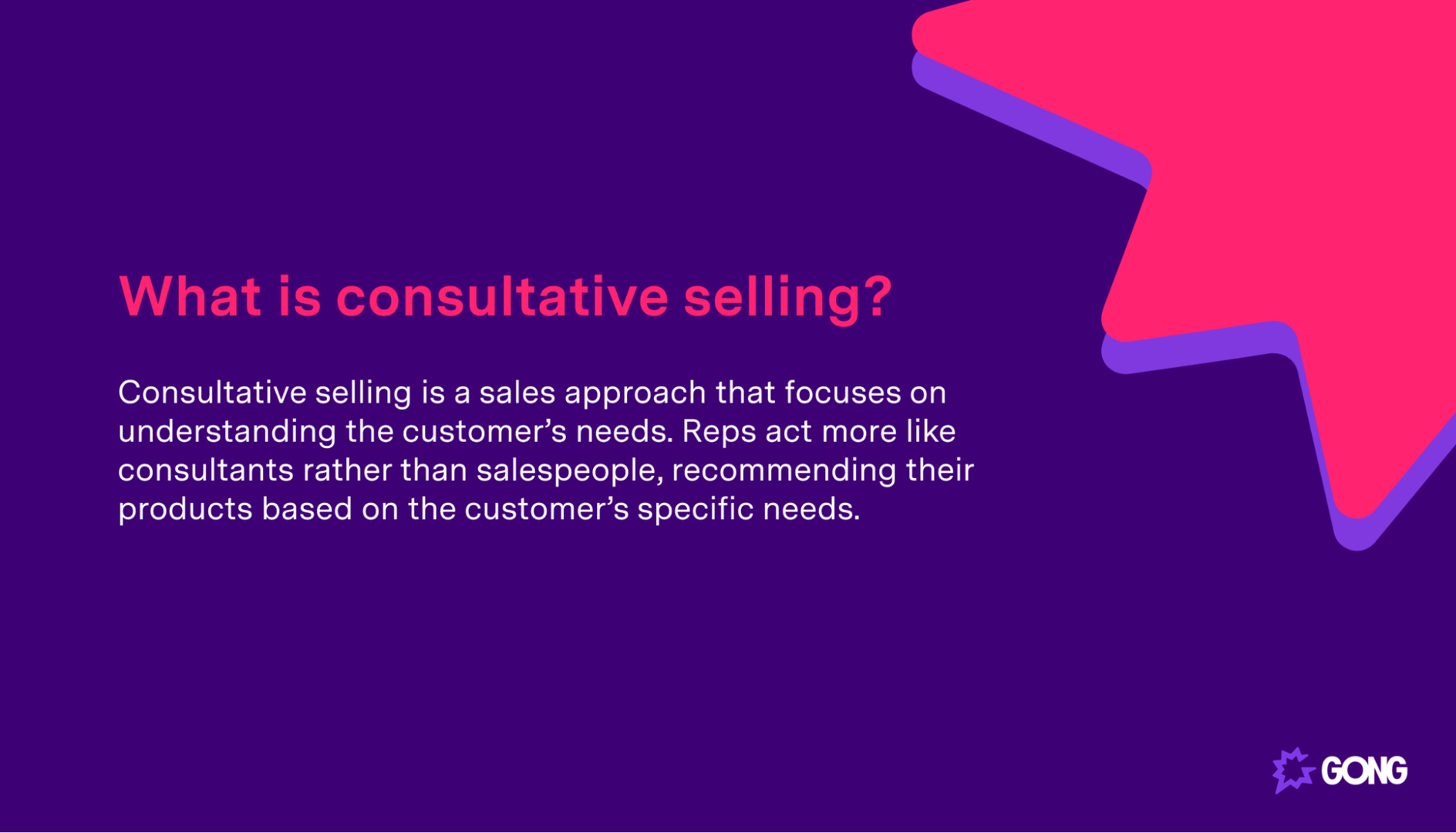
What are the benefits of consultative selling?
Increased revenue is one of the biggest benefits of consultative selling, especially in terms of annual contract value (ACV). Understanding your buyer’s needs and tailoring your pitch to meet those needs increases the likelihood of closing the deal, but it also helps you squeeze every drop of value from a contract.
For instance, a strong relationship with your buyer can help you discover opportunities you might have missed. By taking a consultative approach, you may realize that a higher-priced product is a better fit than the standard solution you sell. Or you may identify opportunities to upsell the prospect on additional features or training depending on their needs and concerns.
Consultative selling helps you meet the desires of buyers, too. When you take a consultative approach, you make the entire consultative sales process about the buyer. Funnily enough, that’s exactly how buyers want it to be, with 66% of customers expecting companies to understand their needs.
Giving buyers the experience they demand is a huge competitive advantage to hold over your competitors. Even if they have a slightly more suitable product, your consultative approach can be the deciding factor that convinces the buyer to choose your solution.
Your consultative approach can even win you sales long after the original deal has closed. By acting as a trusted consultant, buyers may reach out to you in the future for advice when they have another issue.
But you can also proactively reach out to them when trying to sell a new product that they may find useful. The value of relationships built using a consultative approach is that the door is always left open.
Consultative selling vs. product selling
Consultative selling is very different from traditional product selling strategies. As we’ve discussed, consultative selling focuses on the customer and helping them achieve their goals. Selling the product isn’t nearly as important.
Product selling, however, focuses on selling the features and benefits of the product. Sales reps push the product itself without thinking too much about how its features align with their buyer’s needs. That’s left for them to figure out.
Product selling may work for transactional sales that don’t require a huge amount of effort to sell. But it doesn’t take a genius to realize that a product-focused strategy isn’t going to be nearly as effective for high touch sales.
You’d be hard-pressed to make any kind of product-focused strategy work in today’s market. Buyers are far better prepared, have much better access to information, and have way more options than 20 years ago.
In short, you’ll struggle to hit targets if you aren’t taking a consultative approach to selling.
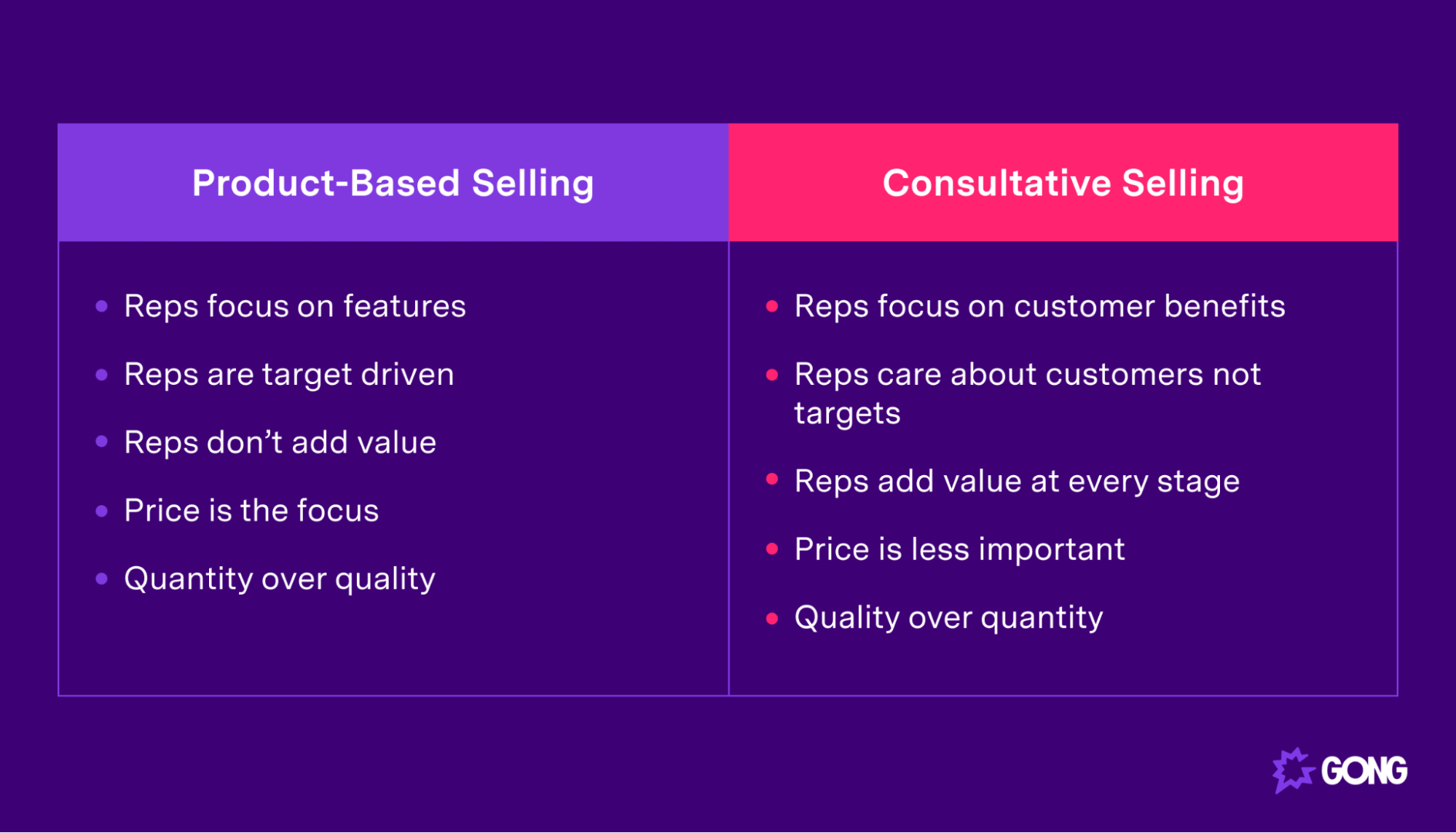
How to be a better consultative seller
By this point, you know what consultative selling is, why it works, and how it is different from a more traditional, product-based sales approach.
Now let’s talk about how to improve those consultative selling skills.
Research like you’re writing a thesis
Understanding your buyer is a tenant of consultative selling. You need to know who they are, what they sell, where their company sits in the market, what challenges they are facing, and dozens of other things if you want to get the relationship off on the right foot.
You should research the buyer very early in the sales process. It’s okay to reach out with a cold call or email to sound out their interest. But once you’ve got positive feedback, it’s time to go all-in on research.
And we mean all-in. Even if you think you’re a pretty good researcher, you need to go above and beyond when using a consultative sales approach.
For instance, don’t just stop at researching the buyer. Research their competitors and the state of the wider industry to better understand their needs. You’ll throw the buyer off guard if you can talk informatively about their industry, and they’ll trust you all the more because of it.
Of course, you’ll also need to be an expert in your own industry. Consultative selling isn’t an approach you can adopt when you’ve only been in a sales role for a couple of months.
Knowing your industry like the back of your hand is banal, so let’s just say you should be comfortable having a wide-ranging back-and-forth conversation with someone else in the industry if you’re going to give consultative selling a go.
Ask all the questions
You won’t be able to do all your research before speaking to your potential customer, which is why it’s important to ask as many questions as possible.
Don’t forget that your buyer has probably already spoken to a dozen sales reps. They know which questions salespeople only ask to elicit a particular response, and they can spot a disguised sales pitch a mile away.
So instead of rehashing the same, tired questions you ask prospects each day, try out some lesser-known discovery questions.
Of course, you don’t want to turn this into an interrogation. Rather than firing off one question after another, have a conversation with your prospect and insert your questions into natural gaps in the conversation. Don’t overdo it, either. The sweet spot number of questions asked during discovery calls is between 11 and 14.
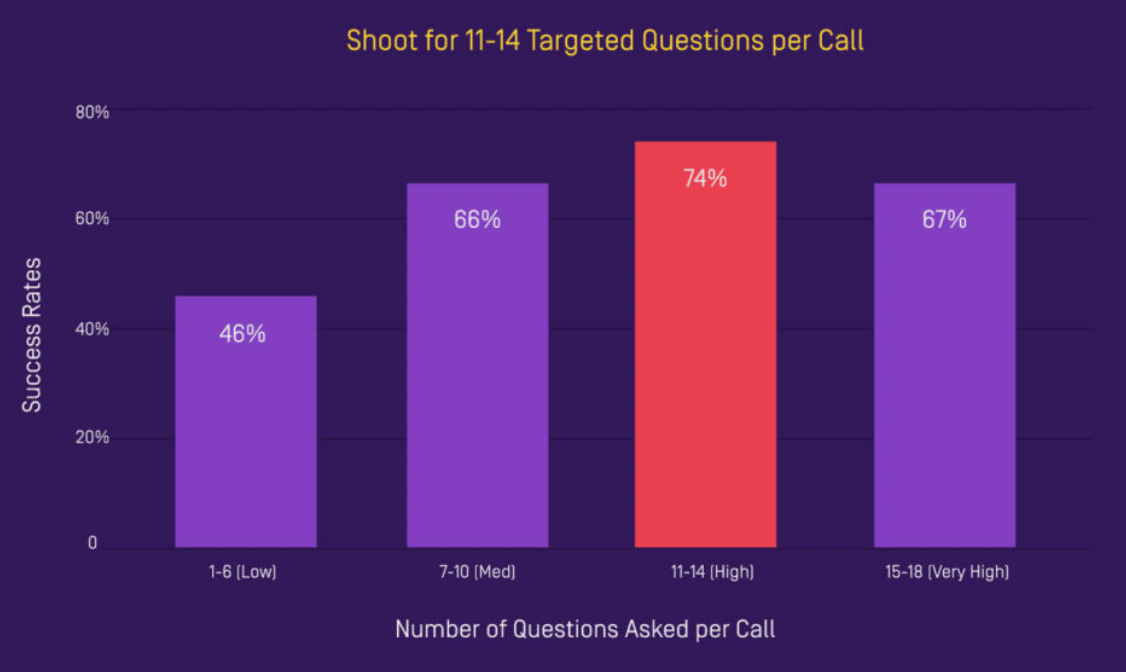
Do feel free to go off on tangents and down rabbit holes during these conversations, though. The more you seem genuinely interested in the prospect and their company, the more they will trust you going forward.
Curiosity really sets good consultative sellers apart. Don’t just take what the buyer says as read, for instance. Really drill down into their answer to uncover what they really mean. Doing so can help you uncover a genuine pain point that could seal the sale.
Actually listen to what your prospect says
To be a good consultative seller, you need to be an active listener. An active listener is someone who doesn’t just hear the words someone is saying but the whole message they’re communicating.
Active listening is much harder than it sounds. You can’t be distracted by anything. That means no noisy sales floor or annoying sales team. If you want to really hear what your buyer says, you need peace and quiet.
Try not to have a series of questions lined up prior to the conversation, either. While this will ensure you get all your points across and qualify the prospect as best you can, it can mean you focus more on asking the next question than you do on listening to what your buyer says.
One way to prove to yourself and your buyer that you’re listening is to paraphrase what you say back to them. Where possible, try to add value to your summary. That could be an insight you have into the market or even a suggestion that you try to solve a particular problem there and then.
Another sales technique is to spend most of your time listening rather than speaking. The very best sellers spend over half of the call listening. Bad sellers, however, average just 28%.
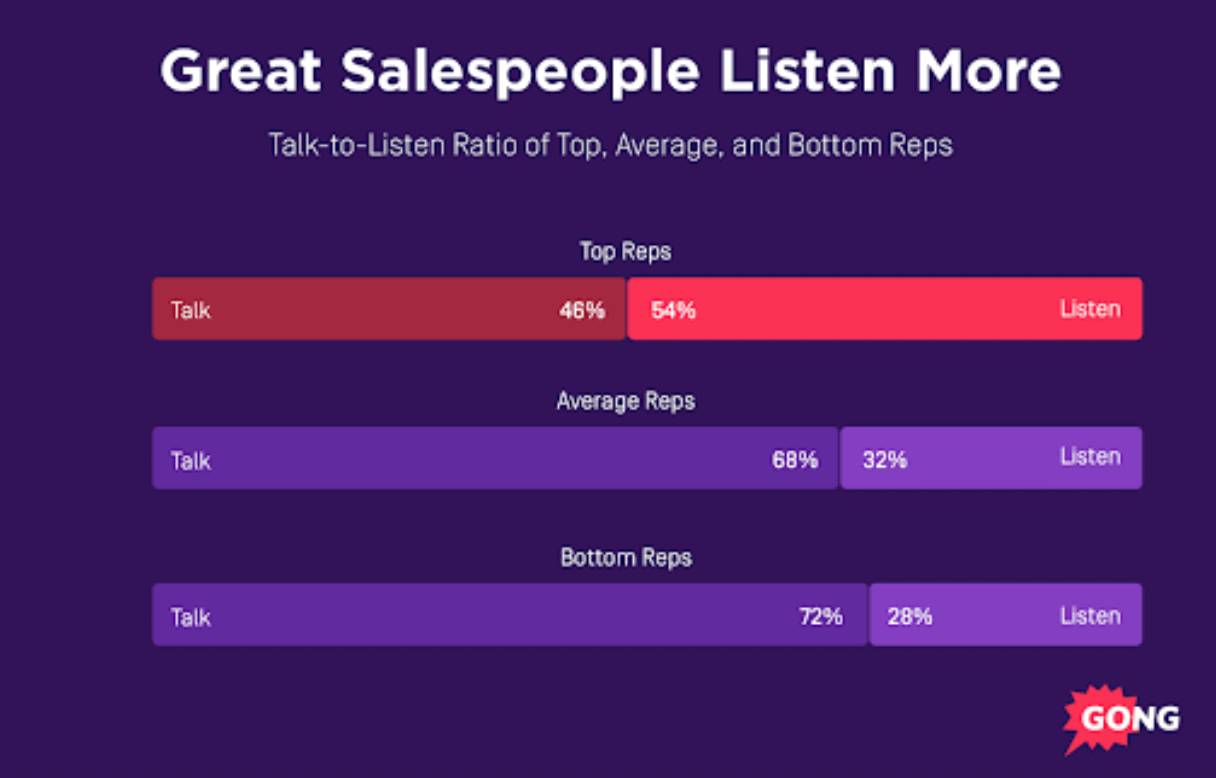
Be your authentic self
The consultative selling methodology is built around trust. And to build the levels of trust and rapport you need, being authentic is key.
Don’t try to act how you think salespeople should act or try to crack jokes when that’s not your personality. That will only scare the customer off. Instead, be approachable and show that you genuinely care about helping the customer.
One of the best ways to be authentic is to be open about your why. Your buyer isn’t a fool, they know you’re calling to make a sale. For instance, on cold calls, you’ll have more success on cold calls by being open about your reason for calling. Our data shows salespeople who have this level of honesty are 2.1x more successful.
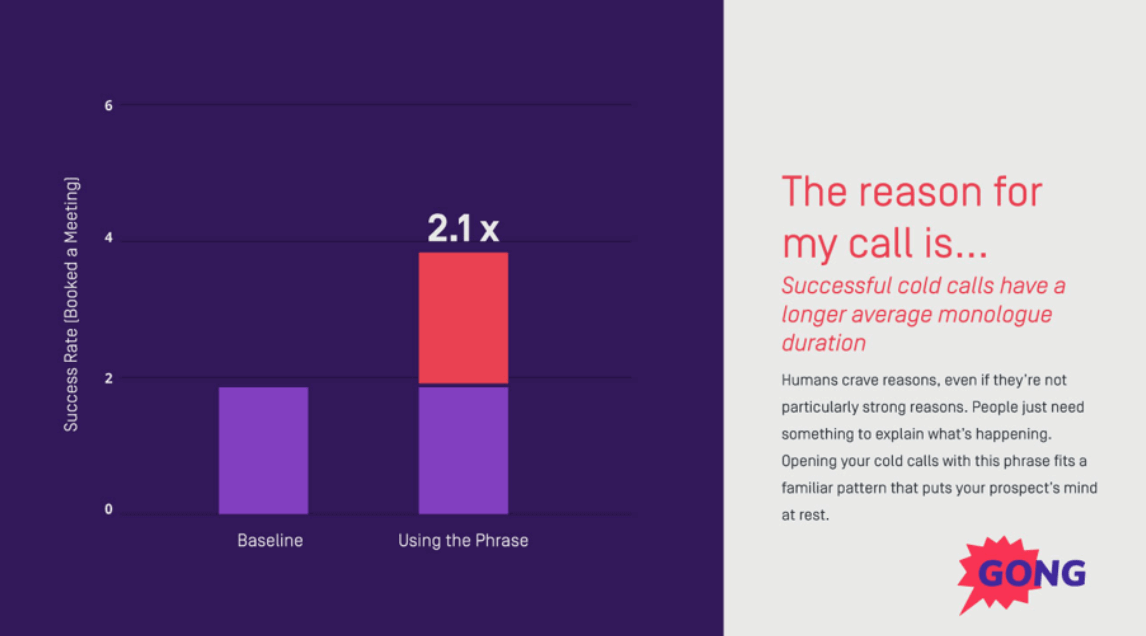
Being authentic also means being honest when it isn’t in your best interests. For instance, if your product clearly isn’t right for the buyer, tell them. There’s no point wasting your time or theirs trying to trick them into buying your product. If it’s a high-ticket item, it will never happen.
Act like a teacher
Now you have built a rapport and understand what the buyer needs, it’s time to add value and educate them where possible.
Education within a consultative selling context comes in two forms. First, you’ll want to use your industry knowledge to add thoughts on insights on overcoming their problems in general. Perhaps you have an example of how a similar company overcame the same challenge or an example of a solution that didn’t work out.
Once you’ve confirmed your product is a suitable solution, you’ll also want to educate the buyer on exactly how it helps.
Here, it’s imperative that you tailor the conversation to your buyer. Discuss only the features and benefits specific to their needs and describe exactly how they could help. If you have case studies, make sure they are relevant, too.
Follow up, follow up, follow up
You won’t close customers immediately using a consultative selling approach. You need to be patient and realize it takes time for customers to come to a decision.
However, that doesn’t mean you shouldn’t regularly follow up with them.
Become a better consultative seller with Gong
Consultative selling is a fantastic sales approach for any rep who knows that delivering value to the buyer is the best way to close the sale. Unlike product selling, it puts the prospect at the center of the process and focuses on solving their needs first.
If you like the consultative selling approach, you’ll also like the Challenger Sales model and SPIN selling, both of which see reps act as consultants.
Whichever sales methodology you adopt, it’s essential that you monitor your performance to make sure you are applying the concepts correctly. This is how Gong can help.
With Gong’s revenue intelligence software on your side, you and your sales managers can see which part of the consultative selling process you are nailing and which part needs a little more work. With complete visibility into your sales approach, it won’t be long until you become a consultative selling maestro.